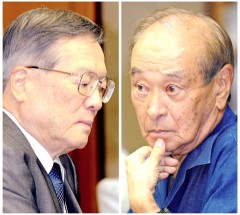Okinawa Governor criticizes Japanese government for understating Osprey emergency landing in North Carolina

Defense Minister Satoshi Morimoto (left) met Okinawa Governor Hirokazu Nakaima at around 1:00pm on September 11 at the Okinawa Prefectural Office.
September 12, 2012 Ryukyu Shimpo
On September 11 Defense Minister Satoshi Morimoto met Okinawa Governor Hirokazu Nakaima at the Okinawa Prefectural Office and explained that the emergency landing by an MV-22 Osprey in a field behind a church in Jacksonville, North Carolina on September 6 was caused by an oil leak in the aircraft’s heat exchanger. Morimoto insisted that no safety issues were involved, saying, “If you notice a warning light blinking when you driving, you pull to the side of the road and check your car. It is something along those lines.” Nakaima disagreed, saying, “If a car’s heat exchanger burns out, its engine will stop. This sort of thing should not be understated.”
After meeting Ginowan Mayor Atsushi Sakima, Morimoto talked to the press, saying, “The emergency landing by the MV-22 Osprey in North Carolina could be likened to someone getting off a bicycle and pushing it to avoid the wheels slipping in bad weather.” Morimoto understated the incident by putting the aircraft’s emergency landing on the same level as that of a car or bicycle. Morimoto’s remarks effectively ignored the concerns of the Okinawan people about the safety of the Osprey, which Sakima described as “fear.”
Morimoto explained, “There was a crack in the heat exchanger of the gearbox, where oil leaked. The heat and oil caused smoke.” He went on to say, “It was a preventative landing that does not qualify as an accident.” In response, Nakaima said twice, “You should not understate this incident.”
Nakaima took up a clearly different position to the Japanese government on the explanation of the deployment of the Osprey to Futenma Air Station, saying, “This is unacceptable. I have great difficulty accepting the Japanese government’s explanation.”
Morimoto concluded that the crash of the U.S. Air Force CV-22 Osprey in Florida in June was due mainly to human error. He seeks the understanding of Okinawan people, saying, “The Japan-U.S. Joint Committee is discussing safety issues.”
However, Nakaima said, “When referring to the cause of the Osprey accidents, the
Ministry of Defense differentiates between human error and mechanical malfunction, but that is like saying that the aircraft will crash without any mechanical malfunction, especially when we consider that young marines train at this base.” Nakaima insisted that the government’s explanation does not ease the Okinawan people’s concerns over the safety of the Osprey.
After the meeting, Morimoto talked to the press. When asked about whether safety measures can be applied in the case that an Osprey makes an emergency landing at the base located in a densely populated area where there are no open spaces around the perimeter, Morimoto said, “I cannot answer that question.”
(English translation by T&CT, Mark Ealey)
Previous Article:Okinawa Churaumi Aquarium displays a rare deep-water fish
Next Article:Delegation from mass rally asks government to cancel deployment
[Similar Articles]
- Okinawa Governor has difficulty accepting the Osprey to Futenma Air Station
- Ginowan Mayor asks Defense Minister to stop Osprey deployment
- Okinawa Governor tells Defense Minister: “If the governments bulldoze their way to deploy the Osprey, all U.S. bases will be closed immediately.”
- Okinawa governor asks Japanese government to cancel plan to deploy more Osprey to Okinawa
- Defense Minister says that he possesses no data on the flight distance capabilities of the Osprey on autorotation in an emergency
 Webcam(Kokusai Street)
Webcam(Kokusai Street)


